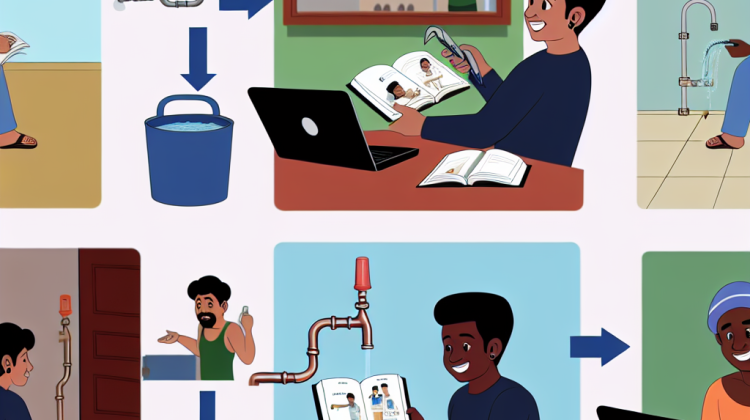
Did you know that plumbing is one of the oldest professions in the world? It’s true! Back in ancient times, the Egyptians and Romans were already building complex systems of pipes and drains. Today, in India, plumbing isn’t just a job; it’s an important skill that helps keep homes and businesses running smoothly.
Learning plumbing work in India has become super popular recently. With so many new buildings popping up everywhere, there’s a high demand for skilled plumbers. Many people find it interesting how plumbing isn’t just about fixing leaks anymore. Now, it’s about understanding how clean water gets into our homes and how waste is taken away safely. Not only does it help us stay healthy, but it also keeps our environment clean.
Getting started with plumbing doesn’t have to feel daunting. One great option is to find an apprenticeship. This means you’ll learn on the job, working with a skilled plumber who will teach you the ropes. You’ll get to see firsthand how to install pipes, fix leaks, and understand local plumbing codes. Did you know that learning on the job can give you an edge? Many plumbers in India start this way and end up with great careers!
But, don’t worry if you can’t find an apprenticeship right away. There are loads of vocational courses that can teach you the basics. Some colleges and training institutes even offer diploma programs in plumbing. These courses usually cover important topics like pipe fitting, drainage systems, and how to use different tools. And here’s a fun fact: the average salary for a plumber in India can go up to ₹30,000 a month! That’s a pretty neat income for someone starting out, right?
In today’s world, being handy and knowing plumbing can really help at home too. If there’s a leaky faucet or a clogged sink, instead of calling for help, you can take matters into your own hands. This not only saves you money but also gives you a sense of pride when you fix things yourself. Imagine telling your friends, “Yeah, I fixed that!” It’s pretty cool to be the go-to person for repairs.
So, whether you decide to jump into an apprenticeship or sign up for a class, remember that patience and practice are key. Just like learning to ride a bicycle, it gets easier the more you do it. And who knows, you might end up loving plumbing so much that you’ll never look at a leaky pipe the same way again!
How to Learn Plumbing Work in India
If you’re keen to pick up plumbing skills in India, you’re in luck! There are lots of ways to dive right in and get started. First off, let’s explore where to begin your plumbing journey.
Find a Good Training Program
One of the best ways to learn plumbing is to join a training program. Many cities in India offer courses in plumbing. These programs usually mix hands-on training with classroom learning. This means you get to practice using tools and fixing pipes while also learning about plumbing basics.
Look for Apprenticeship Opportunities
Another fantastic way to learn is through an apprenticeship. An apprenticeship is like an internship where you work under a skilled plumber. You’ll get to see the real deal and help out while you learn. Plus, it’s a great way to make connections in the plumbing world!
Online Courses and Videos
In today’s digital world, online learning is super popular. There are countless websites and YouTube channels that offer free and paid plumbing courses. You can learn at your own pace, while sitting in your pajamas! Some channels even provide step-by-step guides to fix common plumbing problems at home.
Read Books and Manuals
If you prefer books, there are plenty of plumbing manuals and guides available. These books teach everything from basic repairs to advanced techniques. You can find these at local bookstores or online. It’s like having a plumbing expert right in your pocket!
Practice, Practice, Practice!
The best way to learn plumbing is to practice. Fix leaky faucets, unclog drains, or install new fixtures at home or for friends and family. Each job you tackle will build your confidence and skills. Make sure to use safety gear, like gloves and goggles, to keep yourself safe while you work.
Join Plumbing Communities
Don’t underestimate the power of community! Join local plumbing groups or online forums where you can ask questions and share experiences. Other plumbers can offer tips, tricks, and support that can be super helpful as you grow your skills.
Get Certified
Once you’ve gained some experience, consider getting certified. Certification can open doors to better job opportunities. Many places in India offer certification exams that test your plumbing knowledge and skills. It’s a great way to show potential clients that you know your stuff!
Tools of the Trade
Learning plumbing isn’t just about techniques; it’s also about the tools you use. Familiarize yourself with common plumbing tools, like pipe wrenches, plungers, and sealants. Knowing which tool to grab at the right time can make all the difference in getting the job done.
Watch and Learn
- See experienced plumbers in action.
- Ask them questions about what they’re doing.
- Take notes or pictures for future reference!
By doing these things, you’ll start to understand the different ways to solve plumbing problems.
In India, 64% of people still rely on traditional methods for house repairs, making plumbing skills highly valuable!
“`html
How to Learn Plumbing Work in India – FAQ
What’s the best way to start learning plumbing?
The best way to kick off your plumbing journey is by finding a local plumbing course. Many technical schools and polytechnics offer classes tailored for beginners!
Do I need to attend a formal school to become a plumber?
Nope! You can also learn plumbing through apprenticeships. Working alongside a skilled plumber can teach you a lot of hands-on skills.
How long does it take to become a plumber?
It usually takes about 2 to 5 years to become a proficient plumber. This includes your training plus any apprenticeship time!
What tools do I need for basic plumbing work?
Here’s a quick list of must-have tools:
- Pipe wrench
- Adjustable wrench
- Plunger
- Screwdrivers
- Tape measure
Is plumbing a good career in India?
Absolutely! Plumbing is a steady job with lots of opportunities. Everyone needs plumbing, and skilled workers are always in demand!
What kind of plumbing jobs are available?
Plumbing jobs can vary widely. You might work for a company, be self-employed, or even specialize in installations or repairs!
Do I need any certifications to work as a plumber?
While not always required, having a certification can really boost your chances of landing a job. It shows you know your stuff!
How do I find an apprenticeship?
You can find apprenticeships through trade schools, local plumbing companies, or even through family and friends. Just ask around!
Can I learn plumbing online?
Yes, you can! There are many online courses that can teach you the basics, but hands-on practice is super important too!
What’s the salary range for plumbers in India?
Plumbers in India can earn from ₹15,000 to ₹40,000 per month, depending on experience and skills. With time, it can even go higher!
“`
Conclusion
To learn plumbing work in India, first and foremost, find a good place to start. You can look for classes at local technical schools or vocational training centers. Many experienced plumbers offer apprenticeships where you can get hands-on practice. This way, you’ll learn by doing, which is the best way! Don’t forget to read up on plumbing basics and watch some helpful videos online. These resources can really fill in the gaps and give you a head start.
Additionally, getting comfortable with tools is super important. Whether it’s wrenches, pipe cutters, or plungers, knowing how to use them is key. And hey, don’t shy away from asking questions when you’re stuck. The plumbing community is often friendly and willing to help out a newcomer! Lastly, keep honing your skills and stay updated with the latest techniques. With passion, patience, and a little bit of practice, you’ll be the plumber everyone turns to!
